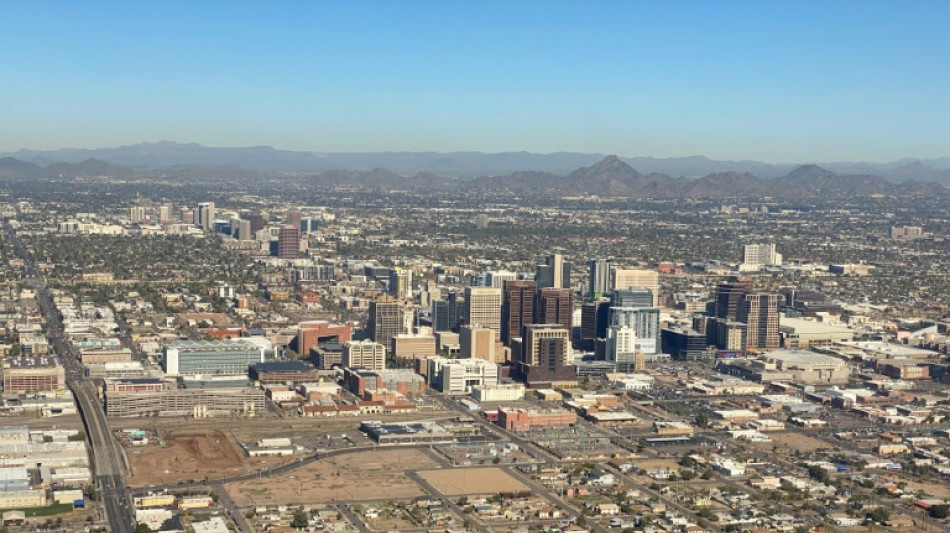
-
 Deadly storm sparks floods in Spain, disrupts Portugal vote
Deadly storm sparks floods in Spain, disrupts Portugal vote
-
Ukrainian flag bearer proud to show his country is still standing

-
 Carney scraps Canada EV sales mandate
Carney scraps Canada EV sales mandate
-
Morocco says evacuated 140,000 people due to severe weather

-
 Spurs boss Frank says Romero outburst 'dealt with internally'
Spurs boss Frank says Romero outburst 'dealt with internally'
-
Giannis suitors make deals as NBA trade deadline nears

-
 Carrick stresses significance of Munich air disaster to Man Utd history
Carrick stresses significance of Munich air disaster to Man Utd history
-
Record January window for transfers despite drop in spending

-
 'Burned inside their houses': Nigerians recount horror of massacre
'Burned inside their houses': Nigerians recount horror of massacre
-
Iran, US prepare for Oman talks after deadly protest crackdown

-
 Winter Olympics opening ceremony nears as virus disrupts ice hockey
Winter Olympics opening ceremony nears as virus disrupts ice hockey
-
Mining giant Rio Tinto abandons Glencore merger bid

-
 Davos forum opens probe into CEO Brende's Epstein links
Davos forum opens probe into CEO Brende's Epstein links
-
ECB warns of stronger euro impact, holds rates

-
 Famine spreading in Sudan's Darfur, warn UN-backed experts
Famine spreading in Sudan's Darfur, warn UN-backed experts
-
Lights back on in eastern Cuba after widespread blackout

-
 Russia, US agree to resume military contacts at Ukraine talks
Russia, US agree to resume military contacts at Ukraine talks
-
Greece aims to cut queues at ancient sites with new portal

-
 No time frame to get Palmer in 'perfect' shape - Rosenior
No time frame to get Palmer in 'perfect' shape - Rosenior
-
Stocks fall as tech valuation fears stoke volatility

-
 US Olympic body backs LA28 leadership amid Wasserman scandal
US Olympic body backs LA28 leadership amid Wasserman scandal
-
Gnabry extends Bayern Munich deal until 2028

-
 England captain Stokes suffers facial injury after being hit by ball
England captain Stokes suffers facial injury after being hit by ball
-
Italy captain Lamaro amongst trio set for 50th caps against Scotland

-
 Piastri plays down McLaren rivalry with champion Norris
Piastri plays down McLaren rivalry with champion Norris
-
ECB holds interest rates as strong euro causes jitters

-
 Spain, Portugal face floods and chaos after deadly new storm
Spain, Portugal face floods and chaos after deadly new storm
-
EU close to sealing trade deal with Australia

-
 German Cup final to stay in Berlin until 2030
German Cup final to stay in Berlin until 2030
-
What does Iran want from talks with the US?

-
 Taming the lion: Olympians take on Bormio's terrifying Stelvio piste
Taming the lion: Olympians take on Bormio's terrifying Stelvio piste
-
Wind turbine maker Vestas sees record revenue in 2025

-
 Italy's Casse tops second Olympic downhill training
Italy's Casse tops second Olympic downhill training
-
Anti-doping boss 'uncomfortable' with Valieva's coach at Olympics

-
 Bitcoin under $70,000 for first time since Trump's election
Bitcoin under $70,000 for first time since Trump's election
-
'I am sorry,' embattled UK PM tells Epstein victims

-
 England's Brook predicts record 300-plus scores at T20 World Cup
England's Brook predicts record 300-plus scores at T20 World Cup
-
Ukraine, Russia swap prisoners, US says 'work remains' to end war

-
 Wales' Rees-Zammit at full-back for Six Nations return against England
Wales' Rees-Zammit at full-back for Six Nations return against England
-
Sad horses and Draco Malfoy: China's unexpected Lunar New Year trends

-
 Hong Kong students dissolve pro-democracy group under 'severe' pressure
Hong Kong students dissolve pro-democracy group under 'severe' pressure
-
Germany claws back 59 mn euros from Amazon over price controls

-
 Germany claws back 70 mn euros from Amazon over price controls
Germany claws back 70 mn euros from Amazon over price controls
-
VW and Stellantis urge help to keep carmaking in Europe

-
 Stock markets drop amid tech concerns before rate calls
Stock markets drop amid tech concerns before rate calls
-
BBVA posts record profit after failed Sabadell takeover

-
 UN human rights agency in 'survival mode': chief
UN human rights agency in 'survival mode': chief
-
Greenpeace slams fossil fuel sponsors for Winter Olympics

-
 Greenpeace slams fossel fuel sponsors for Winter Olympics
Greenpeace slams fossel fuel sponsors for Winter Olympics
-
Kinghorn, Van der Merwe dropped by Scotland for Six Nations opener

| CMSC | -0.17% | 23.48 | $ | |
| SCS | 0.12% | 16.14 | $ | |
| NGG | -0.71% | 87.17 | $ | |
| RBGPF | 0.12% | 82.5 | $ | |
| RYCEF | -0.36% | 16.62 | $ | |
| RIO | -4.49% | 92.335 | $ | |
| CMSD | 0.21% | 23.92 | $ | |
| GSK | 3.44% | 59.27 | $ | |
| BTI | 0.61% | 62.01 | $ | |
| BCE | -4.2% | 25.279 | $ | |
| RELX | 0.73% | 30 | $ | |
| BCC | -2.52% | 88.01 | $ | |
| VOD | -6.98% | 14.685 | $ | |
| AZN | 0.78% | 188.92 | $ | |
| BP | -2.42% | 38.275 | $ | |
| JRI | 0.3% | 13.19 | $ |

Arizona limits building as groundwater dries up
New houses that rely on dwindling groundwater supplies around one of the United States' biggest cities are to be banned, officials said Thursday, in a sign of the strains that drought and climate change are causing across the US west.
Water managers in Arizona say there is a significant shortfall in the Phoenix area, and that any more development in the fast-growing city must rely on other sources of water -- such as under-strain rivers.
"Over a period of 100 years, the Phoenix (area) will experience 4.86 million acre-feet of unmet demand for groundwater supplies," the Arizona Department of Water Resources said.
An acre-foot is the amount of water it takes to cover an acre with a foot of water -- around 326,000 gallons (1.23 million liters) -- and is equivalent to around half an Olympic-size swimming pool.
"The term 'unmet demand' refers to the amount of groundwater usage that is simulated to remain unfulfilled as a result of wells running dry."
The western United States is in the grip of a more-than two- decade drought and a long-term aridification, which scientists say is being exacerbated by human-caused climate change.
Major rivers that cross the region, among them the Colorado River, have long been over-exploited, with far more water removed every year than falls as rain or snow.
This has led to shrinking reservoirs, including the enormous Lake Mead, which last year dropped to just a quarter of its capacity, threatening "deadpool" -- the point where the river downstream dries up and hydroelectric power production ceases.
With rivers under pressure, fast-growing population centers have long tapped groundwater to provide water for homes and agriculture, in the form of wells.
But this source is easily over-exploited and can in some cases take thousands of years to be replenished.
State officials said permits already issued for developments in Maricopa County, in which Phoenix sits, will not be rescinded, but developers will have to prove any new applications have a sustainable water source other than groundwater.
"The constraints regarding the physical availability of groundwater are attributable to the cumulative results of decades of groundwater overdraft and the continued reliance on groundwater resources," the Arizona Department of Water Resources said.
Phoenix, the country's fifth largest city, is home to around five million people and is one of the fastest growing metropolitan areas in the United States.
The announcement Thursday is the latest move in a long battle over water in the US West.
Last month states that rely on the Colorado River reached an agreement on cutting the amount of water they take from the lifeblood of the region.
Around 40 million people including in Los Angeles, Las Vegas and Phoenix depend on the river.
But what was one of the world's great rivers has now shrunk.
Human-caused climate change means the once-bountiful snowpack that feeds the river has dwindled.
What snow there is melts more quickly because of higher temperatures, and more is lost to evaporation.
Scientists say a wet winter in the US West has alleviated some pressure on the system, but this is only a temporary reprieve as human-caused climate change continues to exacerbate a long-term drying trend.
H.Jarrar--SF-PST


